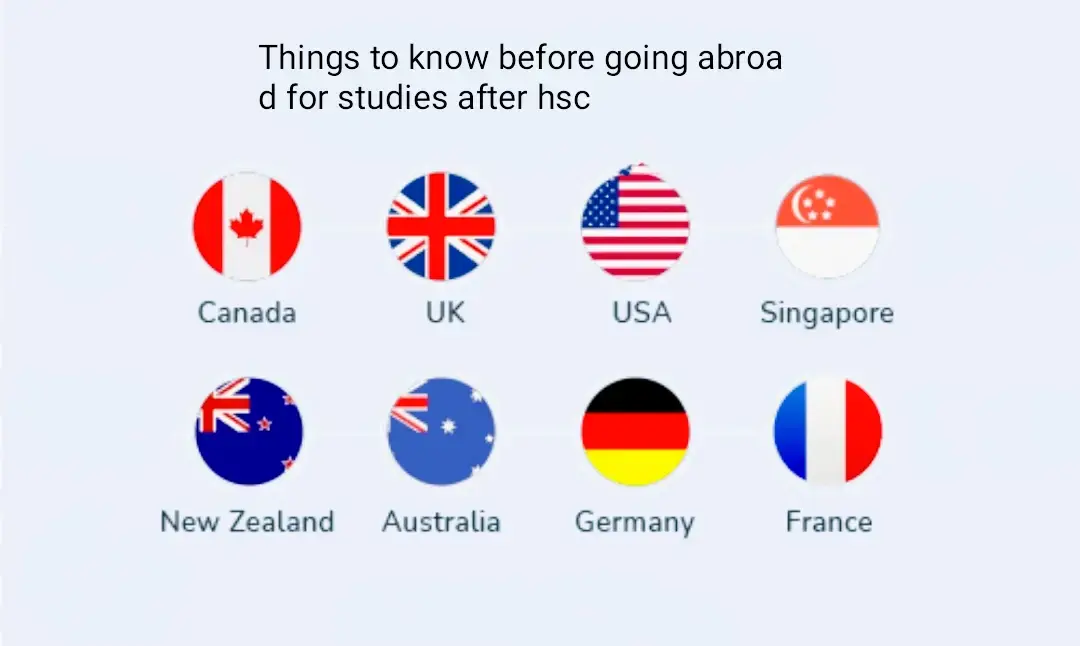Things to know before going abroad for studies after Hsc

Things to Know Before Going Abroad for Studies After HSC
Table of Contents
Embarking on a journey to study abroad after completing your Higher Secondary Certificate (HSC) is a thrilling and life-changing experience. The opportunity to study in a foreign country not only allows you to explore new cultures but also provides a platform for personal growth and academic excellence. However, preparing for study abroad can be daunting if you need to be fully aware of the challenges and opportunities ahead. This comprehensive guide will cover everything you need to know before heading abroad for your studies.
Understanding Your Purpose and Goals
Before diving into the practicalities of studying abroad, reflecting on why you want to study overseas is essential. Studying abroad offers a wide range of benefits, such as:
- Cultural Exposure: Studying in a new country immerses yourself in a different culture, improving your global awareness and fostering personal growth.
- Academic Excellence: Many countries offer world-class education and research opportunities that are highly valued worldwide.
- Career Opportunities: A degree from an international university can open doors to global job markets and increase your employability.
Set clear goals for what you wish to achieve through this experience. This will help you stay focused on your journey and select the right program and country that align with your aspirations.
Researching Study Destinations
Choosing the correct country for your studies is one of your most critical decisions. Each destination offers a unique set of advantages and challenges. Some key factors to consider are:
- Quality of Education: Consider countries with reputable educational institutions that offer high-quality programs. Countries like the USA, UK, Canada, Australia, and Germany are known for their excellent universities and diverse courses.
- Cost of Living: Regarding daily expenses, some countries are more expensive than others. Countries like the UK and USA might have higher living costs, while nations like Germany and Canada offer more affordable options.
- Visa and Work Opportunities: Look into the visa policies of the country you’re interested in. Some countries offer post-graduation work opportunities, which can be an added advantage if you want to gain international work experience.
- Language: Some countries require proficiency in their native language, while others offer courses in English. If you need to become fluent in a particular language, studying in a country where you can learn English might be a better fit.
Thorough research is essential to understand the pros and cons of each destination before you make your final decision.
Choosing the Right University and Program
Once you’ve decided on your destination, the next step is selecting the right university and program. Keep the following tips in mind:
- Accreditation: Ensure that the university you choose is accredited and recognized worldwide. This will ensure that your degree is valued and accepted in the global job market.
- Program Specialization: Choose a program that suits your academic interests and career goals. Research the curriculum, faculty, and research opportunities at different universities to determine which program best aligns with your aspirations.
- University Rankings: While rankings are not everything, they can provide some insight into an institution’s reputation and quality. Top-ranked universities often offer better networking opportunities, resources, and facilities.
- Student Support Services: A university with robust student support services, such as academic counseling, career services, and international student networks, can make your transition much smoother.
Ensure you are clear on the program’s admission requirements and deadlines to ensure you complete all critical steps.
Understanding Financial Requirements
Studying abroad can be expensive, and proper financial planning is essential. Key considerations include:
- Tuition Fees: Tuition fees vary significantly from one country to another and between universities. It’s essential to clearly understand the tuition fees for your chosen program and factor this into your budget.
- Scholarships and Financial Aid: Look for scholarships, grants, and financial aid options for international students. Many universities offer scholarships based on merit, financial need, or specific programs.
- Cost of Living: In addition to tuition, you’ll need to budget for living expenses, which include accommodation, food, transportation, and personal expenses. Research the average cost of living in the country and city where you plan to study.
- Bank Accounts and Currency: Familiarize yourself with banking systems in the host country. Setting up a local bank account for easier financial management is a good idea. Also, consider the exchange rates and how they might affect your overall expenses.
A solid financial plan will help alleviate some of the stress of studying abroad.
Visa and Immigration Requirements
Securing a student visa is a crucial step in studying abroad. Visa requirements vary depending on the country you’re applying to. Generally, the process involves:
- Application Process: Research the visa application process for your chosen destination. Some countries require proof of acceptance into a university, while others may require you to demonstrate financial stability.
- Visa Interview: Some countries may require you to attend an interview as part of the visa application process. Be prepared to answer questions about your study plans, financial situation, and future goals.
- Work Permits: Many countries allow international students to work part-time during their studies. Ensure you understand the work visa regulations and how many hours you can work weekly.
Ensure you apply for the visa well in advance to avoid delays.
Accommodation and Living Arrangements
Deciding where to live during your studies abroad is a critical decision. You have several options to consider:
- On-Campus Housing: Many universities offer on-campus accommodation, which can be convenient and allow you to interact with other international students. However, on-campus housing can be expensive and in high demand, so apply early.
- Off-Campus Housing: Renting an apartment or shared house off campus is another option. This can be more affordable and give you more independence, but you may need to commute more.
- Homestays: Some students opt for homestays, where they live with a local family. This can be a great way to immerse yourself in the local culture and language while having a supportive environment.
Consider cost, location, and proximity to your university when deciding on accommodation.
Cultural Preparation and Adapting to a New Environment
One of the biggest challenges of studying abroad is adjusting to a new culture. To help ease this transition, here are some tips:
- Learn About the Culture: Research your host country’s customs, traditions, and social norms. Understanding local culture can help you avoid misunderstandings and integrate easily into your new environment.
- Language Skills: While many universities offer English programs, learning basic phrases in the local language is still beneficial. Knowing how to greet people, ask for directions, and understand typical expressions can make a big difference.
- Student Communities: Many universities have international student groups that can help you connect with others who are going through similar experiences. Joining these groups can provide valuable support during your transition.
Being open to new experiences and maintaining a positive attitude will help you adjust quickly.
Health Insurance and Safety
When studying abroad, ensuring your health and safety is a top priority. Here are some essential tips:
- Health Insurance: Some countries require international students to have health insurance, while others provide it as part of the student visa process. Ensure you are covered for medical emergencies, routine visits, and potential healthcare needs during your stay.
- Emergency Contacts: Know the local emergency numbers and the nearest hospital, as well as how to reach your embassy in an emergency.
- Safety Tips: Stay informed about the safety conditions in your host country. Take necessary precautions when traveling; always tell someone where you’re going.
Having a plan in place for health and safety can give you peace of mind during your studies.
Networking and Career Opportunities
Studying abroad can significantly boost your career prospects, but it’s essential to take advantage of networking opportunities:
- Internships and Part-Time Jobs: Many countries offer opportunities for international students to work part-time or intern in their field of study. These experiences provide a source of income and help you gain valuable work experience.
- Alumni Networks: Many universities have strong alum networks that can help you connect with professionals in your field. Take advantage of networking events, career fairs, and online platforms like LinkedIn.
- Global Perspective: Living in a new country gives you an international perspective, which employers highly value. Emphasize this in your CV and during interviews to show you are adaptable and open-minded.
Networking while abroad can lead to valuable career opportunities after graduation.
Returning Home After Your Studies
After completing your studies abroad, you may return to your home country or continue working abroad. Regardless of your decision, it’s essential to plan your next steps:
- Re-entry Preparation: Returning to life in your home country can be challenging after spending time abroad. Prepare yourself for reverse culture shock and the changes that may have occurred while you were away.
- Job Search: Whether you stay overseas or return home, leverage the skills, knowledge, and experience you gained during your studies to help you land your desired job.
- Maintaining Connections: Keep in touch with the friends, professors, and professionals you met abroad. Maintaining these connections can be valuable for future career opportunities.
Full free scholarship for Bangladeshi students after HSC in USA
Here are some full scholarships available for Bangladeshi students who want to study in the USA after completing their HSC (Higher Secondary Certificate):
The United World Colleges (UWC) Scholarships
- Overview: UWC offers full scholarships for international students, including those from Bangladesh, to study at one of their 18 global campuses, including in the USA. The program focuses on bringing together students from diverse cultural backgrounds.
- Eligibility: You must be a student from Bangladesh and be between the ages of 16 and 18 when the scholarship starts. You must also demonstrate outstanding academic achievement, leadership potential, and a commitment to intercultural understanding.
- Website: UWC Scholarships
The Fulbright Program
- Overview: The Fulbright Program is a prestigious scholarship funded by the U.S. government. It offers full scholarships for undergraduate studies for international students, including Bangladeshis. The scholarship covers tuition, living expenses, and travel.
- Eligibility: You must have a solid academic background and demonstrate leadership potential. The application process also requires a good command of English.
- Website: Fulbright Bangladesh
The Yale Young Global Scholars Program
- Overview: Yale University offers a full scholarship to international students, including those from Bangladesh, for their pre-college programs. This is not a full undergraduate degree scholarship but a prestigious program for students to experience Yale’s academic environment.
- Eligibility: High school students with strong academic performance, leadership skills, and a passion for learning.
- Website: Yale Young Global Scholars
The Hubert H. Humphrey Fellowship Program
- Overview: While typically for graduate students, this program offers opportunities for non-degree study in the U.S. for young professionals. It is open to individuals from Bangladesh with a significant track record in leadership, public policy, and professional development.
- Eligibility: Must be a mid-career professional with leadership potential and demonstrate significant academic and professional achievements.
- Website: Hubert H. Humphrey Fellowship
The Stanislaus State University Scholarships
- Overview: Stanislaus State University offers full scholarships for undergraduate programs for international students, including those from Bangladesh.
- Eligibility: Academic excellence, a demonstrated passion for education, and English language proficiency.
- Website: Stanislaus State Scholarships
The DAAD (German Academic Exchange Service) USA Scholarship
- Overview: Although this is a German scholarship, students in Bangladesh can apply for it through DAAD’s U.S. partner organizations. These organizations offer full scholarships for study abroad, including at U.S. institutions.
- Eligibility: Generally available for students pursuing graduate studies, but specific programs also apply to undergraduate students.
- Website: DAAD USA
The Asian Development Bank-Japan Scholarship Program (ADB-JSP)
- Overview: ADB-JSP offers full scholarships for graduate studies, but some undergraduate opportunities are available depending on the program. This scholarship is for students from ADB’s member countries, including Bangladesh, and supports full tuition, living expenses, and airfare.
- Eligibility: A solid academic background and a commitment to community development in your home country.
- Website: ADB-JSP
The U.S. Embassy Scholarships
- Overview: The U.S. Embassy in Dhaka also provides various scholarships for Bangladeshi students to study in the USA. These scholarships often cover full tuition and living expenses.
- Eligibility: You must apply through the U.S. Embassy’s educational exchange programs, which include various undergraduate and postgraduate scholarships.
- Website: U.S. Embassy Dhaka
These programs require strong academic and extracurricular profiles and a competitive application process. It’s best to start preparing early by gaining leadership experience, volunteering, and focusing on academic excellence.
Study abroad from Bangladesh after hsc
Studying abroad after completing Higher Secondary Certificate (HSC) in Bangladesh is an exciting opportunity that can provide you with a global education and broaden your career prospects. Here is a detailed overview of the process, requirements, and key considerations for Bangladeshi students looking to pursue higher education abroad:
1. Choosing a Country for Higher Studies
Before applying to universities abroad, you need to choose the country where you want to study. Several countries are popular among Bangladeshi students for their quality of education, affordability, and work opportunities. Some top destinations include:
- United States: Known for a diverse range of programs, scholarships, and high-ranking universities like Harvard, MIT, and Stanford.
- United Kingdom: Offers globally recognized universities, with programs designed to be flexible. Popular destinations include London, Edinburgh, and Manchester.
- Canada: Known for its multicultural environment, high-quality education, and post-graduation work opportunities.
- Australia: Offers numerous scholarships, particularly for South Asian students, with top universities like the University of Melbourne and the University of Sydney.
- Germany: Known for its high-quality education, especially in engineering, and many universities offer free or low-cost education.
- Malaysia: A popular choice for Bangladeshi students due to its proximity, affordability, and high-quality institutions like the University of Malaya.
2. Selecting a Course/Program
After deciding on the country, the next step is to select a course or program that aligns with your interests and future career goals. Popular programs among Bangladeshi students include:
- Engineering (Mechanical, Civil, Computer Science, etc.)
- Business & Management (MBA, Finance, Marketing)
- Medicine & Health Sciences
- Computer Science & IT
- Architecture & Design
- Social Sciences & Humanities
- Natural Sciences (Physics, Chemistry, Biology)
3. Eligibility Requirements
Each country and university may have specific eligibility requirements, but generally, the following are needed:
- HSC or equivalent certification: You must have completed your Higher Secondary Certificate with good grades. Some countries may require a minimum GPA or specific subject marks.
- Language Proficiency Tests: Most countries require proof of proficiency in the language of instruction, usually English. Standardized tests include:
- TOEFL (Test of English as a Foreign Language)
- IELTS (International English Language Testing System)
- PTE (Pearson Test of English)
Some universities also accept a waiver for students with a strong academic background in English.
- Entrance Exams: For some specific courses like engineering, medicine, or business, students may need to take an entrance exam. For example:
- SAT (Scholastic Assessment Test) for the United States
- GRE (Graduate Record Examination) for postgraduate courses
- GMAT (Graduate Management Admission Test) for business studies.
- Documents: Universities may require the following documents:
- Academic transcripts (HSC or equivalent)
- Proof of language proficiency (IELTS, TOEFL, etc.)
- Passport copy
- Statement of Purpose (SOP)
- Letters of Recommendation (LOR)
- CV/Resume (if applicable)
- Financial documents (to prove you can fund your education abroad)
4. Application Process
The application process typically involves the following steps:
- Research: Start by researching the universities, courses, and countries you’re interested in. Each university has its own deadlines and specific admission requirements.
- Prepare Documents: Gather all the required documents, such as academic transcripts, recommendation letters, and your statement of purpose.
- Submit Applications: Most universities allow online applications. Submit your application along with the required documents before the deadlines. It’s important to apply to multiple universities to increase your chances of acceptance.
- Wait for Offer: After applying, universities will assess your application and may offer you a conditional or unconditional admission offer.
- Accept Offer and Apply for Visa: Once you accept an offer, you can proceed with your student visa application. You will need to provide proof of sufficient funds for your tuition and living expenses, as well as your offer letter from the university.
5. Visa Application
Obtaining a student visa is an essential part of studying abroad. Each country has specific visa requirements, but the general process involves:
- Submitting an application for a student visa through the relevant embassy or consulate.
- Providing documents such as proof of admission, financial support, passport, photographs, and a visa application fee.
- Attending a visa interview (if required).
For example:
- USA: F-1 Student Visa
- UK: Tier 4 (General) Student Visa
- Canada: Study Permit
- Australia: Subclass 500 Student Visa
6. Financing Your Studies
Studying abroad can be expensive, but there are several ways to finance your education:
- Scholarships and Grants: Many universities and organizations offer scholarships for international students based on merit, financial need, or other criteria.
- Bangladeshi Government Scholarships: The Bangladesh government offers various scholarships to students studying abroad.
- University-specific Scholarships: Some universities provide scholarships for Bangladeshi students. Always check the university’s scholarship opportunities.
- External Scholarships: Programs like the Fulbright Scholarship (USA), Commonwealth Scholarship (UK), and DAAD Scholarship (Germany) are excellent opportunities for Bangladeshi students.
- Part-time Jobs: Some countries, like Australia and Canada, allow international students to work part-time during their studies. This can help you cover living expenses.
- Loans: If necessary, you can take an education loan from a Bangladeshi bank or an international financial institution.
7. Accommodation and Living Arrangements
When studying abroad, you need to arrange accommodation. Most universities offer on-campus housing, but there are also off-campus options like private hostels or apartments. Consider the following when choosing:
- Cost: Living costs vary significantly between countries and cities. Plan your budget accordingly.
- Location: Choose accommodation close to your university to reduce commuting time.
- Safety: Ensure that the area you choose to live in is safe for international students.
8. Post-Study Opportunities
Many countries offer post-graduation work opportunities. For instance:
- United States: The Optional Practical Training (OPT) program allows students to work in the US for up to 12 months after graduation.
- United Kingdom: The Graduate Visa allows international students to stay and work for up to 2 years after completing their degree.
- Canada: The Post-Graduation Work Permit (PGWP) allows students to stay and work in Canada after completing their studies.
- Australia: The Temporary Graduate Visa lets international students work in Australia after graduation.
Studying abroad is a significant investment in your future, and while it requires careful planning and preparation, the benefits of global exposure, quality education, and career opportunities make it a rewarding experience. As a Bangladeshi student, you need to research, plan ahead, and ensure you meet all the requirements for a successful application to study abroad.
How to get a scholarship after HSC?
Getting a scholarship after completing your Higher Secondary Certificate (HSC) can significantly ease the financial burden of pursuing higher education. Scholarships are awarded based on various criteria, such as academic excellence, extracurricular achievements, financial need, and community involvement. Below is a detailed guide on how to increase your chances of obtaining a scholarship after HSC:
1. Identify the Types of Scholarships Available
Scholarships can be broadly categorized into several types:
- Merit-Based Scholarships: Awarded to students based on academic performance, often in high grades or top ranks in HSC exams.
- Need-Based Scholarships: These are awarded to students who demonstrate financial need. You may need to provide income documents or proof of family economic status.
- Sports or Extracurricular Scholarships: Awarded to students who excel in sports, music, arts, or other extracurricular activities. In these cases, you may need to demonstrate exceptional skills or achievements.
- Country-Specific Scholarships: Many countries offer scholarships for international students from specific countries, which can be merit-based or need-based.
- University-Specific Scholarships: Many universities have scholarship programs for students, often aimed at helping first-year students or those pursuing particular fields of study.
2. Research Available Scholarships
You must start your search early for scholarships and research various opportunities:
- Government Scholarships: Many countries, including the government of your own country, provide scholarships for students pursuing undergraduate studies. Look for government websites and education portals for relevant scholarship announcements.
- University Scholarships: Many universities offer scholarships for HSC graduates. Check the official websites of universities you’re interested in, as they typically have a “Scholarships” section with all the necessary information.
- Private Organizations and Foundations: Numerous non-profit organizations, foundations, and corporations offer scholarships for higher education. Websites like Scholarships.com, Fastweb, or Chegg Scholarships can be helpful.
- Local Scholarships: Local or regional scholarships, often provided by businesses, community organizations, or local government bodies, may have less competition. Look for these through local school boards or community centers.
3. Understand the Eligibility Criteria
Every scholarship has its own set of eligibility requirements. Common requirements include:
- Academic Performance: Most scholarships require a minimum GPA or scholarly achievement. For example, top scorers in HSC may be eligible for merit-based scholarships.
- Extracurricular Involvement: Some scholarships require applicants to demonstrate involvement in extracurricular activities such as sports, the arts, leadership roles, or volunteer work.
- Financial Need: Need-based scholarships typically require proof of your financial situation, such as family income and the number of dependents.
- Field of Study: Certain scholarships are awarded to students pursuing specific courses, such as engineering, medicine, or the arts.
- Nationality: Many scholarships are available only to citizens or residents of specific countries or regions.
4. Prepare Your Documents
Scholarship applications usually require the following documents:
- Academic Transcripts: Provide your HSC mark sheets and transcripts, ensuring that you meet the grade requirements for the scholarship.
- Letters of Recommendation: Some scholarships may ask for letters of recommendation from teachers, school principals, or employers who can vouch for your academic performance or character.
- Proof of Extracurricular Activities: Certificates, awards, or documentation demonstrating your extracurricular achievements.
- Financial Documents: For need-based scholarships, you’ll need to provide proof of financial need, such as income certificates or tax returns of your parents/guardians.
- Statement of Purpose or Personal Statement: A well-written essay explaining why you deserve the scholarship, academic goals, and future aspirations.
- Standardized Test Scores: Some scholarships, particularly those for international students, may require SAT, GRE, or IELTS scores.
5. Write a Strong Scholarship Essay
Many scholarships require an essay or personal statement. This is your chance to present yourself and your goals compellingly. Here are some tips:
- Be Clear and Concise: Focus on your goals, achievements, and why you are applying for the scholarship. Avoid irrelevant details.
- Highlight Your Strengths: Discuss academic achievements, leadership skills, community service, or unique personal experiences.
- Show Passion and Motivation: Explain why you’re passionate about your field of study and how the scholarship will help you achieve your academic and career goals.
- Proofread: Ensure that your essay is free from errors. Have someone else review it before submission.
6. Apply to Multiple Scholarships
Do not limit yourself to just one scholarship. Apply to as many as possible, increasing your chances of success. Keep track of deadlines and eligibility criteria for each scholarship to ensure you submit all required materials on time.
7. Submit Your Application
Once your application is ready, submit it according to the instructions. Some scholarships may require physical submission of documents, while others may have an online application process. Be sure to follow the specific guidelines for each scholarship.
8. Stay Organized and Follow Up
After submitting your application:
- Keep Records: Make sure you have a copy of each application and its supporting documents.
- Track Deadlines: Ensure you complete all application submission deadlines or any follow-up documentation.
- Follow-up: If necessary, follow up with the scholarship committee to confirm that your application has been received.
- Prepare for Interviews (If Applicable)
Some scholarships may require an interview as part of the selection process. If you are selected for an interview:
- Practice: Be ready to discuss your academic achievements, goals, and why you are a good fit for the scholarship.
- Stay Confident: Present yourself confidently and professionally during the interview.
9. Accept the Scholarship Offer
If you are awarded a scholarship, you will typically receive an official letter or email. Read the terms and conditions carefully and confirm your acceptance according to the instructions.
Some Popular Scholarships for HSC Graduates:
Here are a few scholarships you can explore after completing your HSC:
- Commonwealth Scholarships: Aimed at students from the Commonwealth nations for studying in the UK.
- Fulbright Program: U.S.-based scholarships for international students pursuing undergraduate and graduate studies.
- Tata Scholarship (India): For students pursuing undergraduate programs at Cornell University in the United States.
- University Scholarships: Most top universities like Harvard, MIT, or Stanford offer merit-based scholarships for HSC graduates.
By thoroughly researching your options and carefully preparing your application materials, you can increase your chances of securing a scholarship and making your higher education more affordable.
Conclusion
Studying abroad after HSC is an exciting adventure that can profoundly shape your future. However, it requires careful planning and preparation. From selecting the right destination to managing finances, understanding visa regulations, and adapting to a new culture, there are many factors to consider. By following the tips outlined in this guide, you can ensure that your experience abroad is academically enriching and personally rewarding.
To know more….
> Comprehensive Guide to Online Psychology Bachelor’s Degree in California



